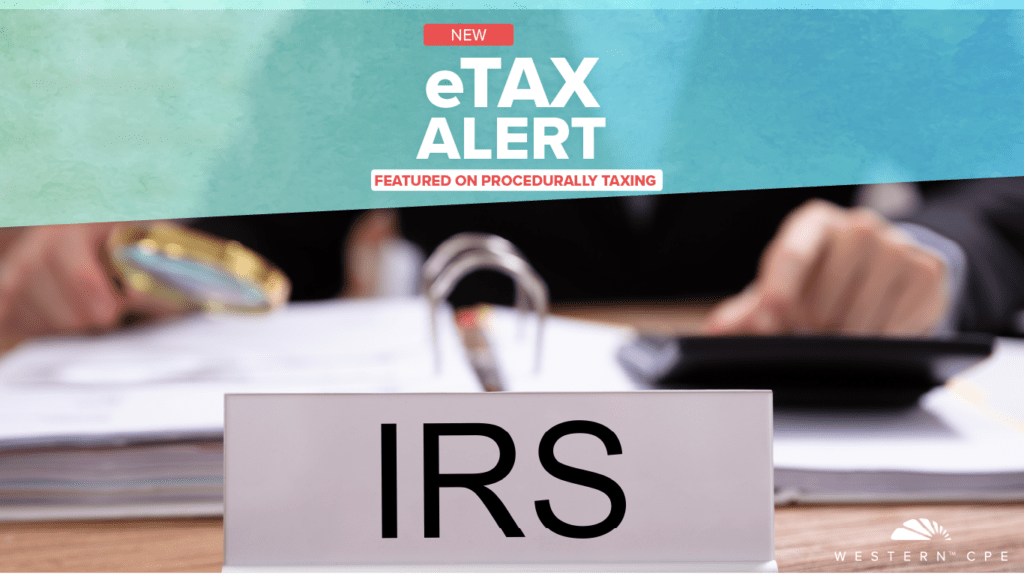

Daniel Werfel testified before the Senate Finance Committee on Feb. 15, 2023, in a hearing considering his nomination to become the next IRS commissioner through November 2027. If Werfel is confirmed, (which is likely), what can tax practitioners expect to see?
Background On Daniel Werfel
Werfel began his civil servant career in the late 1990s as a rank-and-file policy analyst, rising to becoming appointed Office of Management and Budget (OMB) Controller in 2009. He has worked for the Office of Information and Regulatory Affairs, Department of Justice Civil Rights Division, OMB, and as Acting IRS Commissioner when appointed by President Obama in 2013. In his prior service at the IRS, Werfel took the helm of the agency while it was under political fire stemming from intense scrutiny of applications for tax exempt status of groups based on their names or perceived political affiliation. Since 2014, he has been a director at Boston Consulting Group in the Public Sector Practice.
What can you expect from Werfel?
You might be able to gain insight from his opening statement to the Senate Finance Committee:
“At OMB, I learned that the essential foundation of government is public trust. Public trust requires transparency, collaboration with oversight entities such as Congress, adherence to the rule of law, and responsible stewardship of taxpayer dollars. Public trust also requires that the government carry out its mission fairly and equitably.”
While preparing for his testimony, Werfel began the daily habit of reading the Taxpayer Bill of Rights. He singled out The Right to be Informed – that taxpayers need to understand and have clarity of what is expected of them. Accordingly, Werfel pledged an objective to “meet taxpayers where they are.”
Much of the senators’ questions in the nomination hearing last week were focused on the $80B allocated to the IRS in the Inflation Reduction Act. We’ll address some of those questions below.
Who is going to get audited with IRA funds allocated to enforcement?
Senators were concerned that low-income, middle-class taxpayers and small businesses could be targeted. Senator Catherin Cortez Masto (D-NV) stated that she had heard there is going to be 87,000 agents that were hired to audit, and sometimes heard that they would be armed. She questioned, “Are you intending to hire 87,000 agents to audit the Americans based on this funding?” Werfel responded, “I think it’s patently incorrect. In fact, I enter the job with a directive from Secretary Yellen to not use IRA funds to increase audits on anyone earning less than $400,000 whether that be a small business or a working family. Instead, my understanding is to hire people with the understanding and capacity and talent to unpack very complicated, intricate returns, which is a capacity gap that exists today. So, I think the notion of armed agents is incorrect. I certainly would have no intention of making that part of any plan going forward.”
Practitioner Perspective. 87,000 armed federal agents is enough to scare anyone. This political banter was debunked by former IRS Commissioner Rettig last year in an op-ed for Yahoo! Finance. Expect highly trained, experienced examiners performing audits of the most sophisticated, high-income taxpayers and complex income tax returns. Partnership and S corporation audit rates will certainly be increasing. Werfel opined that some preparers of these returns may switch sides and move into (or return to) government service.
The fine print on the $400,000 income level exemption is that audit rates will not increase relative to historic audit rates. There is no mention of how far back the IRS will go to determine the historic audit rates.
Committee chair Ron Wyden (D-OR) posited his belief that there is a two-tiered enforcement system split between the low-income taxpayers and the wealthy. He asked, “What would you do specifically to audit partnerships favored by billionaires at a higher rate than low-income taxpayers who claim the EITC?” Werfel responded that effective tax implementation needs to have equity. In order to achieve equity, there should be balance in the audit footprint, which does not exist today. The senator also referred to a recent study by Stanford University, University of Michigan and the Treasury Department indicating that Black taxpayers are three times more likely to get audited. Werfel committed to finding out what is causing this disparate treatment and report back to the committee within 60 days of being confirmed.
Practitioner Perspective. With the IRS estimating that 21% to 26% of EITC claims are paid in error, don’t expect the audit rates of EITC returns to drop until there is a decrease in the error rate. Preparers need to maintain their education and knowledge of EITC requirements and complete the required due diligence checklist for impacted returns.
Where will funds allocated to technology be spent?
Senator Robert Menendez (D-NJ) queried whether the IRS would be following the lead of 17 states where scanning income tax returns is already in place. He requested Werfel to commit to scanning all paper-filed individual income tax returns for the 2024 filing season. Without making the commitment, Werfel replied, “Moving from paper to digital environments is an absolute priority. I know that they have started scanning and looked at scanning solutions. The commitment that I would add is that we should absolutely be pushing more paper to electronics, and I think scanning is the way to go.”
Werfel also commented that technology needs to be an important part of customer service, from two-way communication to smart phone apps that will allow taxpayers to obtain the services they need.
Practitioner Perspective. Scanned paper-filed returns would be a huge leap forward for practitioners attempting to resolve client issues and for IRS being able to process or work on returns remotely. Paper-filed returns are subject to a myriad of potential errors not present in e-filed returns – misprints, shuffled or missing pages, signature issues, mishandled/damaged mail, input errors, etc. Being able to compare scanned returns with originals could allow practitioners to assist in correcting errors quickly. Scanned returns could also be processed/worked by employees from any location, not just the service center where the return was received.
Ranking member Senator Michael Crapo (R-ID) wanted Werfel to commit to transparency on spending the IRA funds with regular updates on expenditures. Werfel did commit to working with the Senate Finance Committee and providing as much information as possible on where and how much of the appropriated funds were spent.
In responding to Senator Sherrod Brown (D-OH) about whether regulation of paid tax preparers would reduce the error rates in EITC and Child Tax Credit, Werfel stated that it was intuitive. Werfel declined to opine on whether Congress should give IRS authority to regulate tax preparers, indicating that the Commissioner’s job would be to determine whether it could be administered. He did state, “Problems with tax preparers degrade the integrity of the tax system. So, should we look for solutions to improve it? Yes.”
Final Practitioner Perspective
The next IRS commissioner will be the first to start spending funds appropriated under the IRA. Werfel has the appropriate background and experience to spend the funds wisely and timely. Expect to see a lot of activity, change, upgrades and (hopefully) improvements.
Recent Stories
Next Up...
- |
- TaxByte







